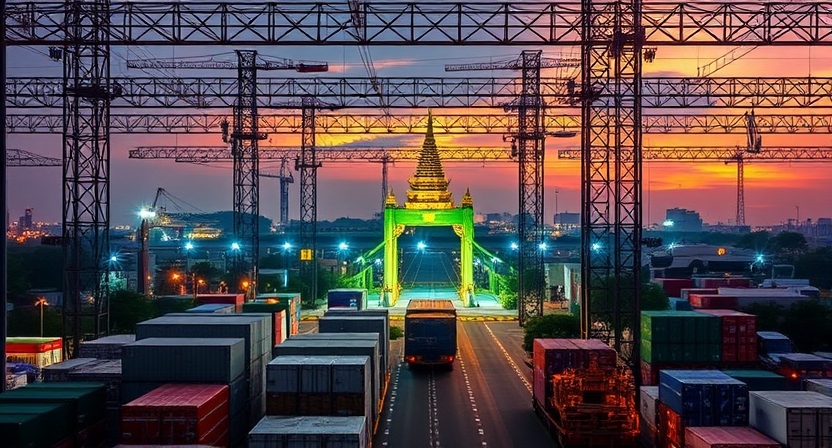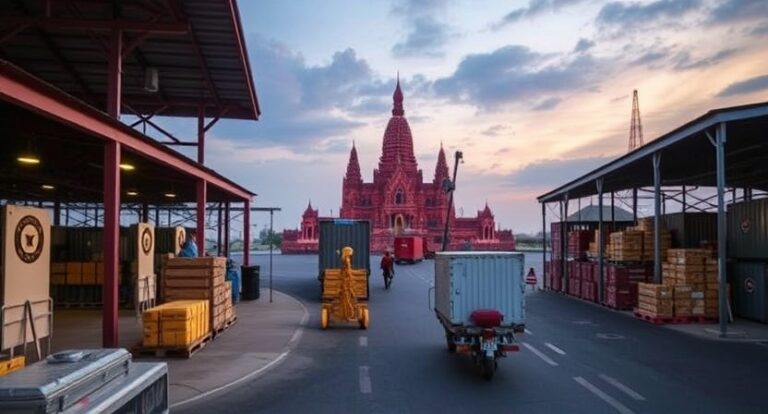As Cambodia continues its rapid industrialization, the country’s logistics and manufacturing sectors are set to play a crucial role in Southeast Asia’s evolving production landscape. By 2025, Cambodia will not only be a manufacturing powerhouse but will also strengthen its position as a central hub for international trade. Thanks to its strategic location, improving infrastructure, and cost-effective manufacturing environment, Cambodia is positioned to be an essential player in the global supply chain. In this blog, we will explore the key trends and developments shaping Cambodia’s logistics and manufacturing sectors and how businesses can leverage these opportunities with the help of an Asia agent.
Cambodia’s manufacturing sector has seen exponential growth over the past decade, largely due to the country’s affordable labor costs and its strategic location in Southeast Asia. By 2025, Cambodia is expected to solidify its status as a key manufacturing hub, attracting even more foreign investment from global companies looking for low-cost production options. Alongside this, Cambodia’s logistics infrastructure is evolving, with significant improvements in transportation and connectivity that will further enhance its role in the global supply chain.
The growing demand for Cambodian-made products across the world has driven the need for more efficient logistics solutions, including modernized ports, expanded road networks, and advanced warehousing facilities. With Cambodia positioned as a gateway to ASEAN and the rest of Asia, the country’s logistics infrastructure is expected to become a major advantage for international companies.
Improving Infrastructure to Support Manufacturing
By 2025, Cambodia’s logistics infrastructure is expected to see major upgrades that will directly impact the manufacturing sector. The construction of new highways, expanded port capacities, and better rail connections will reduce transportation costs, decrease lead times, and enhance the efficiency of the entire supply chain. The port of Sihanoukville, Cambodia’s busiest port, is undergoing expansion to accommodate growing import and export demands. This strategic upgrade will not only ease the flow of raw materials into manufacturing hubs but also help Cambodian-made products reach international markets faster and more cost-effectively. Additionally, the improvement of Cambodia’s road networks and the development of modernized industrial parks will support efficient transportation of goods, boosting the competitiveness of the country’s manufacturing industry.Regional Connectivity and Trade Agreements
Cambodia’s integration into regional trade networks will continue to grow by 2025. As a member of the ASEAN Economic Community (AEC), Cambodia benefits from free trade agreements (FTAs) with countries like China, Japan, and the European Union. These agreements reduce tariffs and streamline customs procedures, making Cambodian exports more competitive. With improved logistics infrastructure and strong trade relations, Cambodia is well-positioned to become a preferred hub for multinational companies looking to expand their supply chains in Southeast Asia. The ease of moving goods within the region and to international markets will enhance the attractiveness of Cambodia as a manufacturing and logistics base.Garment and Textiles
Cambodia’s garment and textile industry has been the backbone of the country’s manufacturing sector for years, and by 2025, it will remain a key driver of economic growth. The country’s low labor costs and favorable trade agreements with global markets ensure that Cambodia will continue to be a major supplier of affordable clothing, apparel, and textiles to international retailers. Improved logistics and transport networks will make it even easier for garment producers to receive raw materials and export finished products, further boosting the industry’s growth. Cambodia’s growing emphasis on sustainable and eco-friendly textile production will also create new opportunities for businesses in the fashion industry.Electronics and High-Tech Manufacturing
As Cambodia seeks to diversify its manufacturing base, the electronics sector will become an increasingly important part of the economy by 2025. The country is already seeing significant foreign investment in electronics and consumer goods manufacturing, particularly from companies looking to reduce their reliance on China. Cambodia’s low-cost labor and developing infrastructure make it an attractive destination for companies in the tech sector. By 2025, Cambodia is expected to have expanded its capacity for high-tech manufacturing, particularly in areas like consumer electronics, mobile phone assembly, and electrical components. This sector will be supported by the country’s improved logistics networks, which will allow for quicker delivery of components and more efficient production timelines.
As Cambodia continues to grow as a manufacturing and logistics hub, businesses looking to enter or expand in the market can greatly benefit from the services of an Asia agent. An Asia agent offers valuable expertise in navigating local regulations, identifying reliable manufacturing partners, and optimizing supply chain management.
Streamlining Supply Chain Operations
An Asia agent can help businesses streamline their logistics and supply chain operations in Cambodia by providing local insights and connections. With expertise in navigating Cambodia’s evolving infrastructure and logistics networks, an Asia agent can ensure that products move efficiently from factories to ports and onward to international markets. They can also assist in identifying the most cost-effective transportation routes, helping businesses save on logistics costs while maintaining delivery timelines. By leveraging their local knowledge, businesses can ensure that their supply chains in Cambodia are optimized for maximum efficiency.Facilitating Regulatory Compliance
The regulatory environment in Cambodia can be complex for foreign companies, especially those unfamiliar with local laws and regulations. An experienced Asia agent can guide businesses through the necessary legal and regulatory processes, ensuring compliance with Cambodian labor laws, import/export regulations, and tax policies. This will allow companies to focus on their core business while the agent handles the legal complexities of doing business in Cambodia.Identifying Reliable Manufacturing Partners
Working with the right manufacturing partners is crucial for success in Cambodia’s growing production sector. An Asia agent can help businesses identify trusted local manufacturers, ensuring that products meet quality standards and are produced efficiently. With strong local networks, agents can recommend factories with the right expertise and capacity to meet specific production needs.
Cambodia is set to emerge as a key player in Southeast Asia’s manufacturing and logistics sectors. The country’s improving infrastructure, strategic location, and favorable business environment will position it as a preferred destination for global companies looking to optimize their supply chains and reduce production costs.
Businesses looking to capitalize on Cambodia’s growth can benefit from partnering with an experienced Asia agent. With their local knowledge and expertise, Asia agents can help businesses navigate the complexities of logistics and manufacturing in Cambodia, ensuring successful and efficient operations in this emerging Southeast Asian hub.
As Cambodia continues to develop its manufacturing capabilities and logistics networks, 2025 promises to be a pivotal year for businesses looking to leverage the country’s growing potential in the global supply chain.

